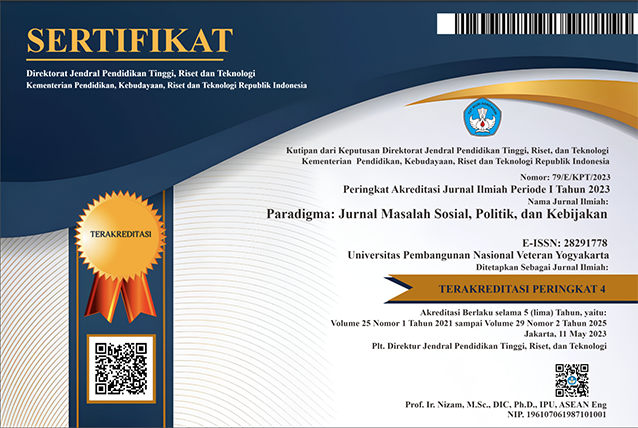Konstruktivisime sebagai Pendekatan Alternatif dalam Hubungan Internasional
DOI:
https://doi.org/10.31315/paradigma.v16i1.2456Keywords:
Constructivism, ideas, deeds, material condition.Abstract
In the study of international relation, Constructivism proposes an alternative way to analize international phenomenon. It evaluates that the two previous approach, Realism and Liberalism failed in explaining some policies makings by certain countries in differents issues. This approach is built above three elements, those are: relativism, subjectivism and the openness. Through these elements, constructivism tries to avoid the weakness as the positivist approach has, for instance: positivist believes that reality can only be explained by theoretical frame. Thus, the knowledge is based on deeds concepts or speech which has capability in building social constructivism.
Furthermore, Constructivism tries to replace material condition to ideas as the base of international system. This is an important part of constructivism because ideas was put as the main factor on influencing state behaviours and international relations. The impact of this approach is we can find that instead of the defence and economic issues some issues, such as environmental issue, gender issue and human rights issue can determine state behaviours.
Downloads
Published
How to Cite
Issue
Section
License
The manuscript submitted to Paradigma: Jurnal Masalah Sosial, Politik, dan Kebijakan journals are released under the license of Creative Commons Attribution-Non Commercial- ShareAlike (CC BY SA) if and when the article is accepted for publication.
We declare that:
- This paper has not been published in the same form elsewhere.
- It will not be submitted anywhere else for publication prior to acceptance/rejection by this Journal.
- A copyright permission is obtained for materials published elsewhere and which require this permission for reproduction.
Retained Rights/Terms and Conditions
Authors retain all proprietary rights to the published works, such as (but not limited to) the following rights:
- Copyright and other proprietary rights relating to the article, such as patent rights,
- The right to use the substance of the article in own future works, including lectures and books,
- The right to reproduce the article for own purposes,
- The right to self-archive the article
The right to enter into separate, additional contractual arrangements for the non-exclusive distribution of the article's published version (e.g., post it to an institutional repository or publish it in a book), with an acknowledgment of its initial publication in this journal Paradigma: Jurnal Masalah Sosial, Politik, dan Kebijakan



